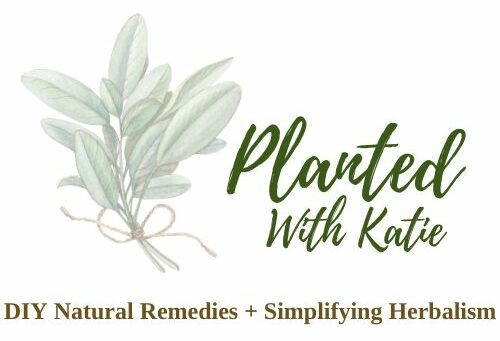7 Natural Home Remedies for Strep Throat Relief
Strep throat is a common bacterial throat infection (from streptococcus bacteria) that affects the throat and tonsils. It is characterized by symptoms like sore throat, difficulty swallowing, and swollen lymph nodes.

Disclaimer: Information and statements shown here are for educational and informational purposes only and are not to replace the advice of your healthcare professional.
This post may include affiliate links. Please refer to our disclaimer for full disclosure.
Traditionally, the common treatment for strep throat has been antibiotics. While antibiotics can effectively kill the bacteria causing the infection, overuse and misuse of antibiotics can lead to antibiotic resistance and other potential drawbacks.
Fortunately, there are natural home remedies that can provide relief for strep throat without the need for antibiotics. In this article, we will explore seven natural remedies that can help soothe the symptoms of strep throat and promote faster recovery. These remedies harness the power of natural ingredients with antibacterial and anti-inflammatory properties to provide relief and support the immune system.
By opting for these best home remedies, you can find alternatives to antibiotics and take a more holistic approach to treating strep throat. Let's dive into these seven natural home remedies for strep throat relief.
10 Symptoms of Strep Throat
Symptoms of strep throat can vary from person to person, but some common signs and symptoms include:

- Sore Throat: This is not a typical sore throat. A severe and persistent sore throat is a hallmark symptom of strep throat. It may make it difficult to swallow or talk.
- Painful Swallowing: Swallowing may be painful, and you may experience discomfort and a scratchy sensation in the throat.
- Red and Swollen Tonsils: The tonsils may appear red and swollen, and there may be white or yellow patches or streaks of pus on the tonsils.
- Enlarged Lymph Nodes: The lymph nodes in the neck may become swollen and tender to the touch.
- Fever: Strep throat is often accompanied by a high fever of 101 degrees Fahrenheit (38.3 degrees Celsius) or higher.
- Headache: Some individuals may experience headaches, often due to the infection and inflammation.
- Fatigue: Strep throat can cause fatigue and a general feeling of being unwell or weak.
- Loss of Appetite: You may have a reduced desire to eat due to the discomfort and pain associated with strep throat.
- Nausea and Vomiting: In some cases, strep throat can cause nausea and vomiting, especially in younger children.
- Rash: In certain instances, strep throat may cause a red rash known as scarlet fever. This rash typically begins on the chest and abdomen and may spread to other parts of the body.
It's important to note that these symptoms are not exclusive to strep throat and can also be present in other throat infections or viral illnesses. If you're unsure, it's best to get a throat culture to know whether you have the strep bacteria.
Why Use Natural Remedies?
Using natural remedies for strep throat relief offers several benefits over relying solely on antibiotics. Here are some reasons why you should consider using natural remedies:
- Antibiotic alternatives: Natural remedies provide an alternative to antibiotics, which are commonly prescribed for strep throat. Overuse and misuse of antibiotics can lead to antibiotic resistance, making it harder for antibiotics to effectively treat bacterial infections in the future. Natural remedies offer a safer and sustainable approach to managing strep throat without contributing to antibiotic resistance.
- Reduced side effects: Antibiotics can sometimes cause side effects such as nausea, diarrhea, and allergic reactions. Natural remedies, on the other hand, generally have fewer side effects and are gentler on the body.
- Immune system support: Natural remedies for strep throat often focus on supporting and boosting the immune system. Strengthening your immune system can help your body fight off the infection more effectively and speed up the recovery process.
- Holistic approach: Natural remedies take a holistic approach to strep throat relief. They not only target the bacterial infection but also address symptoms like sore throat and inflammation. These remedies work in harmony with your body's natural healing processes.
- Long-term health benefits: Many natural remedies used for strep throat relief have additional health benefits. For example, ingredients like honey, garlic, and apple cider vinegar have antibacterial, antimicrobial, and anti-inflammatory properties. Incorporating these remedies into your routine can have positive effects on your overall health and well-being.

Boosting your immune system is crucial in managing strep throat and preventing recurrent infections. Natural remedies often include ingredients rich in vitamins, minerals, and antioxidants, which can help strengthen your immune system and improve your body's ability to fight off infections.
By embracing natural remedies for strep throat relief, you can not only alleviate symptoms but also promote a healthier immune system and overall well-being.
7 Home Remedies for Strep Throat
By incorporating these natural remedies into your routine, you can alleviate symptoms and promote faster recovery without relying solely on antibiotics. Let's dive into these seven powerful home remedies for strep throat relief.
1. Salt Water Gargle
Gargling with warm salt water is a simple yet effective remedy for reducing inflammation in the throat. When you gargle with a salt water solution, the salt acts as a natural disinfectant and helps to draw out excess fluid from the inflamed tissues in the throat.
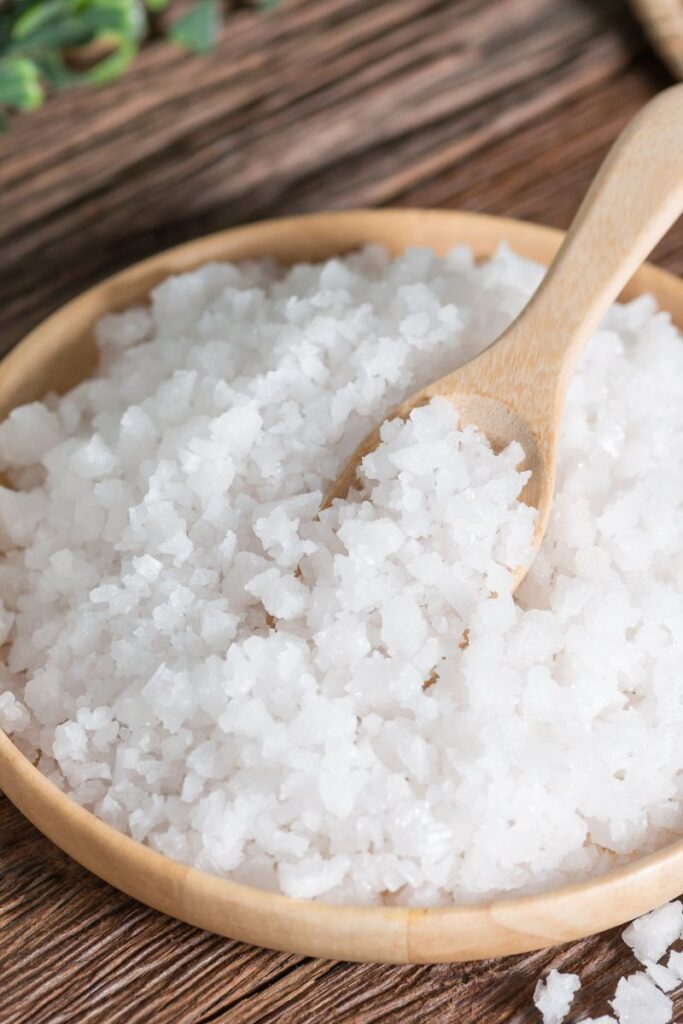
You can use table salt, but I find mineral salt works best for a salt water gargle.
Here's how it works:
- Salt water creates a hypertonic environment, meaning that the salt concentration is higher outside the cells in your throat than inside. This helps to draw out excess fluid and reduce swelling.
- The warm water helps to soothe the throat and provides temporary relief from the discomfort caused by strep throat.
- Salt has natural antibacterial properties, which can help kill some of the bacteria causing the infection in the throat.
By gargling with warm salt water, you can help reduce inflammation, alleviate pain, and promote healing in the throat. It is a safe and natural remedy that can be done multiple times a day to provide relief from strep throat symptoms.
Instructions for preparing and using a saltwater gargle:
- Start with a glass of warm water. Make sure the water is comfortably warm, but not too hot to avoid burning your throat.
- Add half a teaspoon of salt to the warm water. Stir the mixture until the salt dissolves completely.
- Take a mouthful of the salt water solution and tilt your head back slightly.
- Gargle the solution in your throat for about 30 seconds to 1 minute. Be sure to keep your mouth closed to prevent the liquid from going down your throat.
- During the gargle, try to make the solution reach the back of your throat without swallowing it.
- After gargling, spit out the salt water into the sink. Do not swallow it.
- Repeat the process with the remaining salt water solution, gargling for another 30 seconds to 1 minute.
- Rinse your mouth with plain water to remove any residual salt taste.
- It is recommended to gargle with warm salt water 3-4 times a day or as needed for relief.
Remember to always use warm water and ensure that the salt is completely dissolved before gargling.
This simple and effective salt water gargle can help reduce inflammation and provide temporary relief for strep throat symptoms.
2. Raw Honey
Honey has long been used as a natural remedy for various ailments like sore throat relief, due to its numerous health benefits. When it comes to strep throat, a couple tablespoons of honey each day offers both antibacterial and soothing properties that can help alleviate symptoms and support the healing process.
- Antibacterial properties: Honey has been found to have natural antibacterial properties, primarily due to its low moisture content, acidic pH, and the presence of hydrogen peroxide. These properties make honey effective against bacteria, including the ones that can cause strep throat. It can help inhibit the growth of bacteria, reducing the severity of the infection.
- Soothing effect: Honey has a soothing effect on the throat, providing relief from the discomfort and irritation caused by strep throat. It forms a protective film over the throat, reducing inflammation and soothing soreness. The viscous nature of honey also helps to coat the throat, providing a soothing and moisturizing effect.
- Cough suppressant: Honey can also act as a natural cough suppressant, which is a common symptom of strep throat. It can help soothe the throat and reduce the frequency of coughing, providing relief and allowing for better sleep and overall comfort.

When using honey for strep throat relief, it is important to note the following:
- Use raw, organic honey: Raw honey is preferable as it retains its natural antibacterial and healing properties. Look for high-quality honey that is minimally processed and free from additives.
- Consumption methods: Honey can be consumed in various ways for strep throat relief. You can mix it with warm water or herbal tea, add it to lemon water, or take it directly by the spoonful. It is recommended to take a spoonful of honey several times a day or as needed for relief.
- Note: Honey should not be given to infants under the age of one year due to the risk of infant botulism.
- Incorporating honey as a natural remedy can provide relief from strep throat symptoms, thanks to its antibacterial and soothing properties. However, it is important to consult with a healthcare professional for proper diagnosis and treatment, especially if symptoms persist or worsen.
Instructions for using raw honey for strep throat relief:
- Choose high-quality raw honey: Look for raw honey that is organic, unprocessed, and free from additives. Raw honey retains its natural antibacterial and soothing properties, making it the best choice for strep throat relief.
- Spoonful of honey: Take a spoonful of raw honey and consume it directly. Let the honey slowly coat your throat, allowing it to soothe and relieve the discomfort caused by strep throat. You can take a spoonful of honey several times a day or as needed for relief.
- Honey and warm water: Mix a spoonful of raw honey with warm water to create a soothing drink. The warm water can further provide relief to your throat. Sip on this mixture slowly and feel the soothing effect of honey on your strep throat symptoms.
- Honey and herbal tea: Add a spoonful of raw honey to your favorite herbal tea. The combination of honey's antibacterial and soothing properties with the herbal infusion can provide added benefits for relieving strep throat symptoms. Sip on this honey-infused herbal tea throughout the day for relief.
3. Garlic
Garlic is a powerful natural ingredient that possesses both antibacterial and anti-inflammatory properties, making it a beneficial remedy for strep throat relief.
- Antibacterial properties: Garlic contains a compound called allicin, which has strong antibacterial properties. Allicin is released when garlic is crushed or chopped, and it has been found to have antimicrobial effects against a wide range of bacteria, including those that can cause strep throat. The antibacterial properties of garlic help to fight off the infection and inhibit the growth of bacteria in the throat.
- Anti-inflammatory properties: Inflammation is a common symptom of strep throat, leading to swelling, pain, and discomfort. Garlic contains compounds such as diallyl sulfide and diallyl disulfide that have anti-inflammatory effects. These compounds help to reduce inflammation in the throat, providing relief and promoting healing.
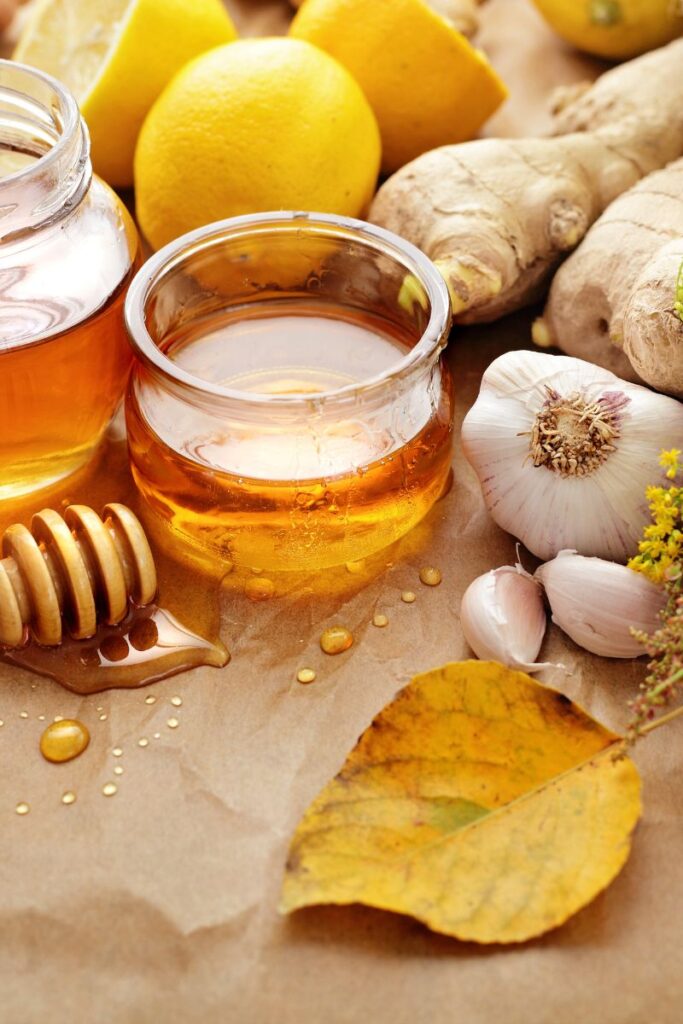
By incorporating garlic into your strep throat treatment, you can benefit from its natural antibacterial properties to combat the infection and its anti-inflammatory properties to alleviate pain and inflammation in the throat.
It is important to note that garlic is most effective when used raw or lightly cooked. Cooking garlic for an extended period of time can decrease its antibacterial and anti-inflammatory properties.
There are several methods of using garlic for strep throat relief. Here are a few:
- Raw Garlic: One of the simplest ways to benefit from the antibacterial and anti-inflammatory properties of garlic is to consume it raw. You can crush or chop a clove of garlic and swallow it with water. However, keep in mind that raw garlic can be quite potent, so you may want to start with a small amount and gradually increase it if tolerated.
- Garlic Gargle: You can prepare a garlic gargle by crushing a few cloves of garlic and steeping them in warm water for a few minutes. After it cools down, strain the mixture and use it as a gargle. Gargle with the garlic-infused water for about 30 seconds to a minute, ensuring that the liquid reaches the back of your throat before spitting it out. Repeat this a few times a day for relief.
- Garlic Supplements: Garlic supplements, such as garlic capsules or tablets, are another convenient way to incorporate garlic into your strep throat treatment. These supplements are typically made from concentrated garlic extract and provide a standardized dosage of allicin and other beneficial compounds. Follow the instructions on the supplement packaging for dosage recommendations.
4. Apple Cider Vinegar
Apple cider vinegar is known for its antimicrobial properties, which can be beneficial for relieving strep throat symptoms. The main antimicrobial component in apple cider vinegar is acetic acid, which has the ability to inhibit the growth of certain bacteria and microbes.
The antimicrobial properties of apple cider vinegar can help in fighting off the bacteria that cause strep throat. It can create an environment in the throat that is unfavorable for the growth and survival of harmful bacteria.

When using apple cider vinegar for strep throat relief, it is important to dilute it with water to avoid any potential irritation or damage to the throat lining. The recommended ratio is to mix one to two tablespoons of apple cider vinegar with a cup of warm water.
Additionally, it is important to note that apple cider vinegar should not be used as a standalone treatment for strep throat. It is best used as part of a comprehensive approach that includes other remedies and medical advice, if needed.
Instructions for preparing and consuming apple cider vinegar for strep throat relief:
- Choose raw, unfiltered apple cider vinegar: Look for apple cider vinegar that is raw, unfiltered, and contains the "mother." The mother is a beneficial bacterial culture that enhances the vinegar's properties. It can usually be found in health food stores or the organic section of grocery stores.
- Dilute the apple cider vinegar: Mix one to two tablespoons of apple cider vinegar with a cup of warm water. You can also add a teaspoon of honey for taste if desired.
- Stir well: Ensure that the apple cider vinegar is thoroughly mixed with the warm water.
- Gargle with the mixture: Take a small amount of the diluted apple cider vinegar mixture and gargle with it for 30 seconds to a minute. Be sure to tilt your head back slightly and allow the mixture to reach the back of your throat. Spit it out after gargling.
- Drink the mixture: You can consume the remaining diluted apple cider vinegar mixture by slowly sipping it. You can repeat this process two to three times a day or as needed for relief.
- Rinse your mouth: After consuming the diluted apple cider vinegar, rinse your mouth with plain water to remove any residual taste and protect your teeth enamel.
- Make a Fire Cider: Fire cider is made with herbs and kitchen medicine covered with apple cider vinegar and left to ferment over a few weeks. It's a potent herbal remedy to use when sick.
It's important to note that apple cider vinegar may not be suitable for everyone. If you have any underlying health conditions, are taking medications, or experience any discomfort or adverse reactions, it is recommended to consult with a healthcare professional.
5. Oil of Oregano
Oil of oregano is known for its potent antibacterial and antiviral properties, which can be beneficial for relieving strep throat symptoms. The key active compounds in oil of oregano, such as carvacrol and thymol, contribute to its antimicrobial effects.
- Antibacterial properties: Oil of oregano has been found to exhibit strong antibacterial properties against various bacteria, including those that can cause strep throat. The active compounds in oil of oregano can help inhibit the growth and spread of bacteria, thereby reducing the severity of the infection.
- Antiviral properties: In addition to its antibacterial properties, oil of oregano also possesses antiviral properties. It has been shown to be effective against certain viruses, potentially helping to combat viral infections that may contribute to strep throat.
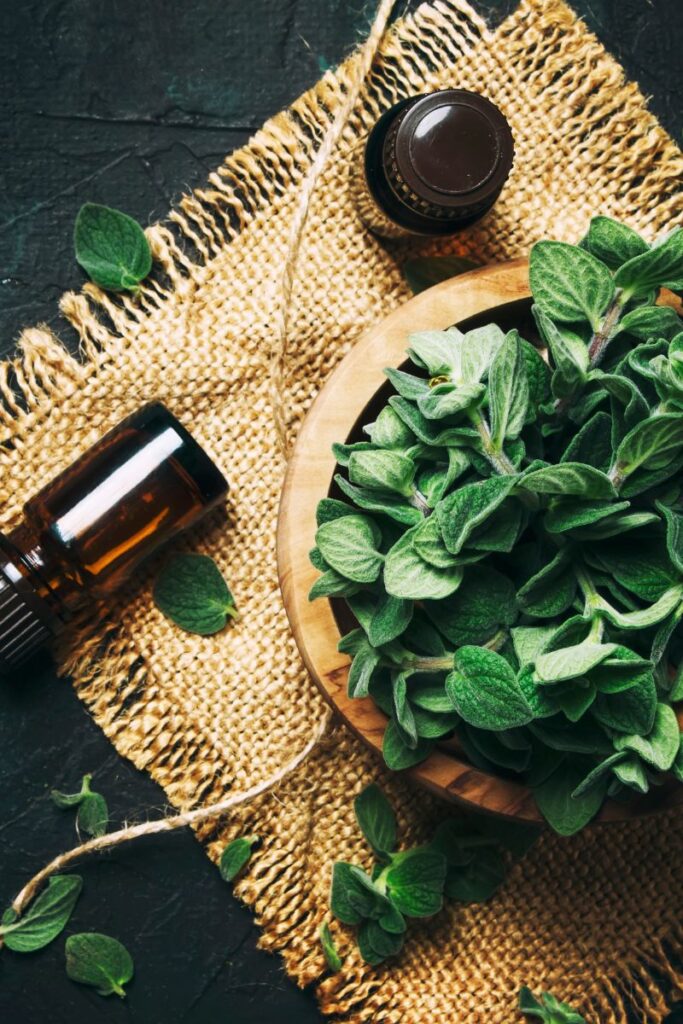
By incorporating oil of oregano into your strep throat treatment, you can benefit from its natural antibacterial and antiviral properties to fight off the infection and support your body's healing process.
It is important to note that oil of oregano is highly concentrated and potent. It should be used with caution and in the recommended dosage. It is typically available in liquid or capsule form. If you decide to use oil of oregano for strep throat relief, it is advisable to consult with a healthcare professional for appropriate guidance, especially if you have any underlying health conditions or are taking medications.
There are several methods of using oil of oregano for strep throat relief. Here are a few:
- Oil of Oregano Gargle: Dilute a few drops of oil of oregano in a glass of warm water. Gargle with this solution for about 30 seconds to a minute, ensuring that it reaches the back of your throat. Spit it out after gargling. Repeat this a few times a day for relief. Be sure to follow the instructions on the oil of oregano bottle for the appropriate dilution ratio.
- Oil of Oregano Capsules: Oil of oregano is available in capsule form as a dietary supplement. Follow the instructions on the supplement packaging for dosage recommendations. Typically, capsules are taken orally with water.
- Oil of Oregano Inhalation: Add a few drops of oil of oregano to a bowl of hot water. Lean over the bowl and cover your head with a towel to create a tent, trapping the steam. Inhale the steam deeply for about 5-10 minutes. This method can help relieve congestion and alleviate throat discomfort.
It's important to note that oil of oregano is highly concentrated and can be strong. Start with a low dosage and gradually increase if tolerated. Always read and follow the instructions on the product packaging.
6. Marshmallow Root
Marshmallow root has been used for centuries as a natural remedy to soothe sore throats and reduce inflammation. It contains mucilage, a sticky substance that forms a protective layer in the throat, providing a soothing effect.
When it comes into contact with water, the mucilage in marshmallow root forms a gel-like substance that coats the throat, helping to alleviate irritation and reduce inflammation. This gel-like coating acts as a barrier, protecting the throat from further irritation and soothing the discomfort associated with a sore throat.
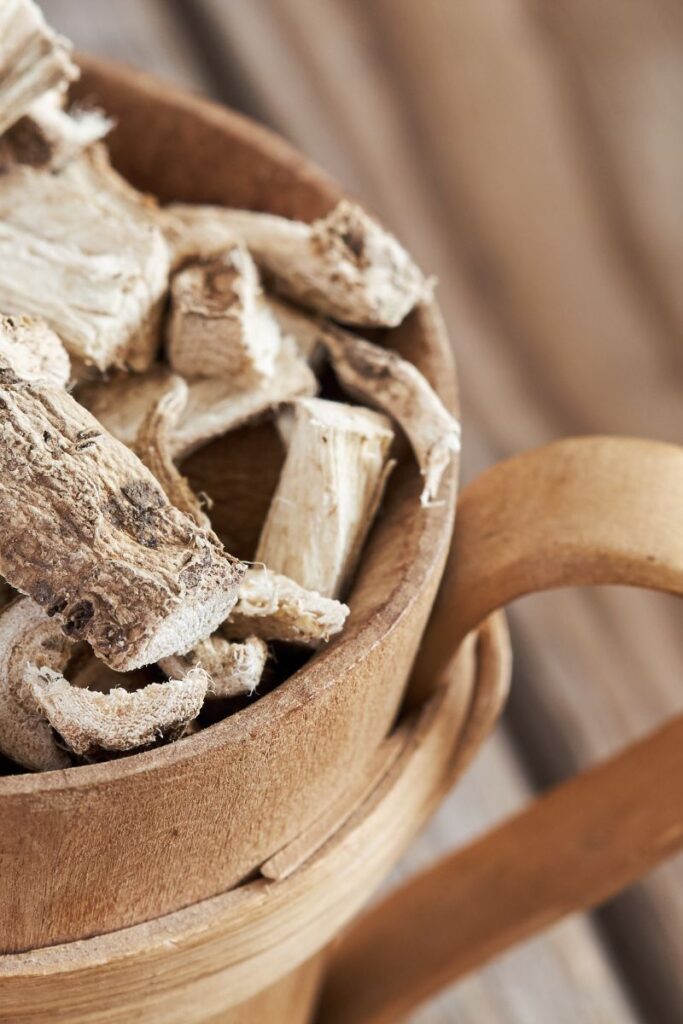
In addition to its soothing properties, marshmallow root also has mild anti-inflammatory effects. It can help calm the inflammatory response in the throat, reducing swelling and pain.
Instructions for making and consuming marshmallow root tea:
To use marshmallow root for strep throat relief, you can prepare marshmallow root tea by steeping dried marshmallow root in hot water for about 10-15 minutes. Strain the mixture and drink the warm herbal tea. Sipping on this marshmallow root tea can help provide relief for a sore throat.
7. Echinacea
Echinacea is a popular herb known for its immune-boosting properties. It has been used for centuries as a natural remedy to support and enhance the immune system. Here's how echinacea can help boost immunity:
- Stimulates immune response: Echinacea contains active compounds, such as flavonoids, polysaccharides, and alkamides, that can stimulate the activity of immune cells, including white blood cells. These immune cells play a crucial role in defending the body against harmful invaders, such as bacteria and viruses.
- Increases production of immune cells: Echinacea has been found to increase the production of immune cells, such as macrophages and natural killer cells. These cells are responsible for identifying and eliminating pathogens in the body, helping to enhance the immune response.
- Anti-inflammatory properties: Inflammation is a natural response of the immune system to infection or injury. However, chronic inflammation can weaken the immune system. Echinacea has anti-inflammatory properties that can help reduce excessive inflammation, allowing the immune system to function optimally.
- Antioxidant activity: Echinacea is rich in antioxidants, such as phenols and flavonoids, which help protect cells from damage caused by harmful free radicals. By reducing oxidative stress, echinacea supports the overall health of the immune system.
- Adaptogenic effects: Echinacea is considered an adaptogen, which means it helps the body adapt to stress and maintain balance. Chronic stress can weaken the immune system, making us more susceptible to infections. Echinacea's adaptogenic properties can help mitigate the negative effects of stress on the immune system.

While echinacea is widely used for immune support, it's important to note that individual responses may vary. Some studies suggest that certain species or parts of the plant may be more effective than others. It's advisable to consult with a healthcare professional before taking echinacea supplements or tea, especially if you have underlying health conditions or are on medications.
Echinacea can be prepared and used in various forms for strep throat relief. Here are some methods:
- Echinacea Tea: To prepare echinacea tea at home, you can start by using dried echinacea roots, leaves, or flowers. Add 1-2 teaspoons of dried echinacea to a cup of hot water. Cover and let it steep for about 10-15 minutes. Strain the mixture and add honey or lemon for taste, if desired. Drink the warm tea once it's seeped and strained. You can consume echinacea tea 2-3 times a day or as needed for relief. Echinacea tea bags or loose-leaf tea can be easily found in health food stores or online. Follow the instructions on the packaging to prepare the tea. Remember to choose high-quality products from reputable brands.
- Echinacea Tincture: To make a homemade echinacea tincture, you will need dried echinacea roots or herbs and high-proof alcohol, such as vodka or brandy. Fill a glass jar halfway with dried echinacea and cover with alcohol, making sure the plant material is completely submerged. Seal the jar tightly and store it in a cool, dark place for 4-6 weeks, shaking it occasionally. After the steeping period, strain the liquid and transfer it to a dark glass bottle. Take a few drops of the tincture mixed with water or juice, as directed by a herbalist or healthcare professional.Products: Echinacea tinctures are available in health food stores or online. Follow the instructions on the product packaging for dosage recommendations.
- Echinacea Lozenges: Echinacea lozenges or throat drops that contain echinacea extract can provide soothing relief for a sore throat. You can find these products in drugstores, health food stores, or online. Follow the instructions on the packaging for proper use.
Including echinacea as part of a healthy lifestyle may help support and strengthen the immune system.
Other Home Remedies For Strep Throat
In addition to the previously mentioned natural remedies, there are several other home remedies that can provide relief for strep throat:
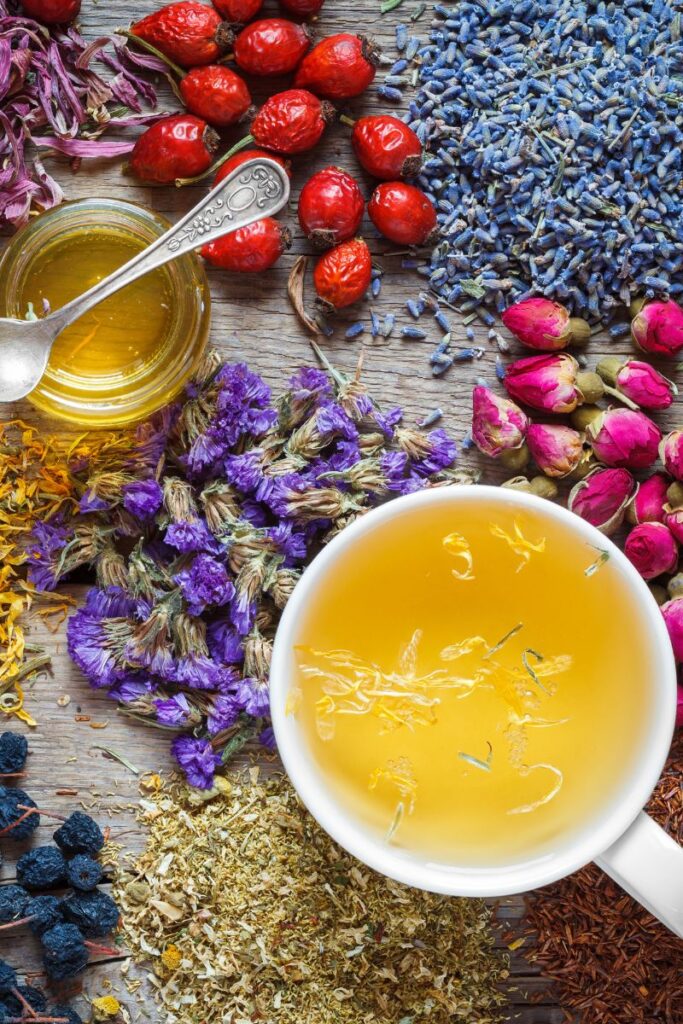
- Coconut Oil Pulling: Swishing coconut oil in your mouth for about 15-20 minutes and then spitting it out can help reduce bacteria in the mouth and throat.
- Ginger Tea: Ginger has anti-inflammatory properties that can help soothe a sore throat. Prepare ginger tea by steeping fresh ginger slices in hot water for 10-15 minutes. You can add honey or lemon for additional soothing effects.
- Warm Liquids: Drinking warm liquids like warm water, herbal teas, or warm honey-lemon water can help ease throat discomfort and keep the throat hydrated.
- Peppermint Tea: Peppermint tea has a cooling effect and can provide temporary relief for sore throat symptoms. Steep peppermint leaves in hot water and enjoy the soothing tea.
- Chamomile Tea: Chamomile has anti-inflammatory and soothing properties. Drink chamomile tea to help reduce inflammation and calm a sore throat.
- Bone Broth: Nutrient-rich bone broth is not only comforting but can also provide the body with essential minerals and amino acids to support healing and boost the immune system.
- Vitamin C: Consuming foods rich in vitamin C, such as citrus fruits, strawberries, kiwi, and bell peppers, can help support the immune system and facilitate the body's healing process. Also, rose hips is a good herb to use for teas to boost vitamin C absorption.
It's also important to drink plenty of water and rest well to allow your body to recover from the infection.
What To Avoid When You Have Strep Throat
When you have strep throat, it is important to avoid certain things that can potentially worsen your condition or hinder the healing process. Here are a few things to avoid:
- Sharing Utensils or Personal Items: Avoid sharing utensils, drinks, or personal items with others to minimize the risk of spreading the infection or reinfection.
- Smoking and Secondhand Smoke: Smoking can irritate the throat, exacerbating the discomfort caused by strep throat. Additionally, secondhand smoke can also worsen symptoms and delay healing.
- Cold and Spicy Foods: Avoid consuming foods that are too cold or spicy, as they can further irritate the throat and increase discomfort.
- Acidic and Citrus Foods: Acidic and citrus foods can irritate the throat and exacerbate the pain. It's best to avoid citrus fruits, juices, and other acidic foods until your throat has healed.
- Alcohol and Caffeine: Alcohol and caffeine can dehydrate the body and irritate the throat, making it more difficult for your body to heal. It is best to limit or avoid these beverages while you have strep throat.
- Overexertion and Strenuous Activities: Resting and taking it easy is important when you have strep throat. Avoid overexertion and strenuous activities that can strain your body and weaken your immune system.
- Self-Medication with Antibiotics: Avoid self-medication or taking leftover antibiotics without proper medical guidance. Antibiotics should only be taken under the supervision of a healthcare professional for the specific type and duration required to treat strep throat effectively.
By avoiding these things and practicing good hygiene, you can help prevent the spread of the infection and allow your body to heal more efficiently.

When to See a Doctor
It is essential to seek medical attention if symptoms of strep throat persist or worsen. While a home remedy and self-care measures can provide temporary relief, they may not address the underlying bacterial infection or potential complications. Here's why it is important to see a doctor if symptoms persist or worsen:
- Accurate Diagnosis: A doctor can conduct a physical examination and perform tests to confirm a strep throat infection. Distinguishing strep throat from other throat infections (such as viral infections) is crucial, as treatment approaches may vary.
- Antibiotic Treatment: Strep throat is a bacterial infection that sometimes requires a full course of antibiotics. Only a doctor can prescribe the appropriate antibiotics based on the type and severity of the infection. Prompt administration of antibiotics helps to eliminate the bacteria, reduce symptoms, and prevent the spread of the infection to others.
- Prevention of Complications: Untreated or inadequately treated strep throat can lead to complications, such as tonsillitis, sinus infections, ear infections, rheumatic fever, or kidney problems. Seeking medical attention allows for proper evaluation, treatment, and monitoring to minimize the risk of developing complications.
- Symptom Management: While waiting for the antibiotics to take effect, a doctor can provide guidance on managing symptoms like pain, fever, and discomfort. They can recommend appropriate pain relievers, warm salt water gargles, or throat lozenges to help alleviate symptoms and enhance comfort during the recovery period.
- Expert Advice: Consulting a doctor ensures that you receive personalized medical advice based on your specific condition, medical history, and any potential risk factors. They can answer any questions you may have, provide proper guidance, and monitor your progress throughout the course of treatment.
If you are experiencing persistent or worsening symptoms of strep throat, it is important to schedule an appointment with a healthcare professional to get medical treatment as soon as possible. They can accurately diagnose your condition, prescribe the necessary treatment, and provide the appropriate care to help you recover effectively.
While I do prefer natural remedies for most non life-threatening cases, everyone is different and must decide the best course of treatment for themselves.
Conclusion
Natural sore throat remedies can offer several benefits for strep throat relief. Here's a recap of their advantages:
- Antibiotic Alternatives: Natural remedies provide an alternative to antibiotics, reducing the risk of antibiotic resistance and its potential drawbacks.
- Reduced Side Effects: Natural remedies generally have fewer side effects compared to antibiotics, making them gentler on the body.
- Immune System Support: Natural remedies often focus on supporting and boosting the immune system, helping the body fight off the infection more effectively.
- Holistic Approach: Natural remedies target not only the bacterial infection but also address symptoms like sore throat and inflammation, working in harmony with the body's natural healing processes.
- Long-Term Health Benefits: Many natural remedies used for strep throat relief have additional health benefits due to their antibacterial, antimicrobial, and anti-inflammatory properties. Incorporating these remedies into your routine can promote overall health and well-being.
In conclusion, by incorporating natural remedies such as salt water gargles, honey, garlic, apple cider vinegar, oil of oregano, marshmallow root, and echinacea into your routine, you can find relief from strep throat symptoms while supporting your immune system and promoting overall well-being.
